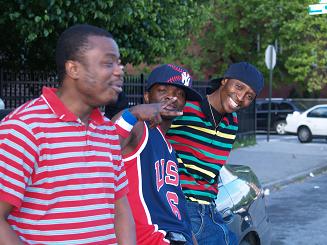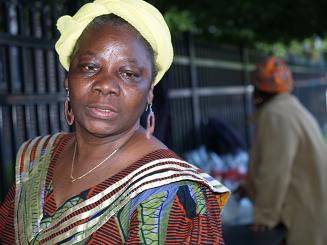I also wanted to send a special thank you to the many colleagues, friends, collaborators, and supporters - you know who you are - for your continued investment and faith in the power of film and the belief that a better world is possible.
Happy Holidays.
Lisa
***

Behind the Scenes of LOVE, LABOR, LOSS
By Lisa Russell
"The baby is not breathing." It was one of the most disturbing statements I heard while shooting my documentary film Love, Labor, Loss in Niger just a few years ago. I had traveled to this West African country to shoot a film on obstetric fistula, a childbearing injury caused by a prolonged, obstructed labor that leaves women childless, incontinent and often ostracized from their communities. It was our second day of shooting and my intention was to film a successful Cesarean section, illustrating one way to prevent obstetric fistula. Unfortunately, the woman we had filmed had waited too long for the surgery. We were left filming her newborn baby as he was dying on camera.
That day, we were visiting the Central Maternity Hospital in the capital, Niamey, intending to shoot interviews and b-roll of the country's most prestigious hospital that focuses primarily on women in difficult labor. When the OB/GYN first introduced us to this patient, she was lying on her side with the back of her hospital gown soaked in blood. Like many other women in Niger who encounter troubles with their pregnancy, she had spent several days traveling by foot, donkey cart and taxi to get to the hospital. "She has been here since 6 am," the doctor explained. I looked at my watch, realizing she had been waiting for over six hours. I asked why she has been waiting so long for her surgery. The doctor explained to me that women must come to the hospital with their "supplies" - meaning all the bandages, syringes, and other items needed for their surgery. This woman's family had been roaming the streets of Niamey since dawn begging for the last $20 needed so that they could trade it for another woman's supplies so the surgery could begin.
Within the next hour, the $60 worth of supplies arrived and the patient was immediately prepped for her c-section. It's obvious this poor, rural woman has never had surgery before (the c-section rate in Niamey is only 2%) and fear covered her face with every move the doctors made. The anesthesiologist waited for the surgeon's go-ahead so that he could sedate her right before the first cut is made. The surgery was quick and the baby was pulled from her abdomen in a manner of minutes. My cameraman and I were both surprised by the seemingly simplicity of the operation.
It wasn't until the child was wheeled into the post-delivery room where the nurse began CPR that I realized how critical the situation had become. The nurse began by putting a suction hose up the infant's nostrils to drain mucous while doing compressions on the baby's chest. I thought this was normal procedure until five minutes passed. I asked what was wrong. "The baby is not breathing," she said as she looked at me, keeping her confidence that all would be all right.
Finally, after about eleven or twelve long minutes after we had arrived in the room, the baby choked for air and began to cry. The nurse pulled out a mouthful of mucous and placed an oxygen mask over the baby as she began to clean up the blood. "He is going to be okay," she confidently told the camera.
When I screen and discuss my film, I don't usually tell this story. The stories people want and expect to hear about obstetric fistula are those about the large numbers of women whose lives have been destroyed by this relatively unknown condition and the numerous programs that are repairing women's fistulas and giving them a new life. They expect to hear about how fistula is perpetuated by early marriages and women's voicelessness when it comes to decision making about their health care. These are all important aspects of the challenge of obstetric fistula.
But in this story, a woman, in labor, is at the country's most adequate facility and is not served because she is poor and her family lacks the resources and know-how to advocate for her life. A woman is at risk of delivering a stillborn baby because a mere $20 cannot be materialized. A doctor, capable and passionate enough to save this woman's life, waits helplessly for the supplies to arrive as he watches her wait in pain and misery. And a camera crew, ready to share a positive story about progress being made in fistula prevention and treatment in Niger, filming a near-death experience with camera equipment whose cost could cover over 100 c-sections.
This story demonstrates that obstetric fistula is not just a woman's issue, nor is it just about the developing world. It is about the economic disparity between the haves and the have-nots. It is about our inability to prioritize people's lives and about legislation that restricts funding based on political battles. And it reflects a sense of complacency towards striving for social equality and progress. The gap between rich and poor countries and between rural and urban areas continues to create conditions that make women at risk for obstetric fistula - lack of education, lack of employment, scarcity of safe motherhood services and indeed, early marriage, which is often justified by the economic security it gives the family.
Because I came to filmmaking with a public health background, I look at obstetric fistula through a human rights lens. Whenever I screen my films, therefore, I try to balance pointing out the effects that local cultural practices - such as early marriages and unattended births - can have on maternal health and mortality, with drawing attention to the legislation and policy that can hamper efforts to improve global women's health. This includes U.S. policies such as the Global Gag Rule, the $34 million withdrawal from the United Nations Population Fund, certain restrictions in PEPFAR funding, as well as our country's refusal to ratify CEDAW (the Convention on the Elimination of All Forms of Discrimination Against Women) which is considered the international bill of rights for women. If we could adhere to the ideals and promises made in the Universal Declaration of Human Rights, to the promises made at the Cairo and Beijing conferences, and could strive towards the goals outlined in the Millennium Development Goals, than maybe we can realize a future where women are not dying in pregnancy or childbirth and their newborns have a chance at a hopeful and productive life.
I believe it is critically important for people, particularly youth, to get a comprehensive introduction to the numerous factors that contribute to inequalities in global health. As Americans we have been programmed to believe that writing a check or organizing a fundraiser alone is enough of a contribution. And while fundraising is definitely an important element in advocating for social change, I believe we need to be watchdogs of the promises made by our leaders and act as global citizens who work in solidarity with women who lack the resources and voice to make change at the global level.
It is partly for this reason that I seek out screenings with young people and engage them in conversations that range from the personal to the global. I do this through integrating different art genres such as film and music and spoken word poetry. I believe we need to empower a more critically thinking, self-expressive generation that can simultaneously focus on personal growth as well as strive for a change in global consciousness. At the National Youth Leadership Forum three times each summer, we transform a 450-person auditorium filled with high achieving high school students interested in medicine anticipating a 90-minute keynote speech into a down-to-earth, honest discussion. We talk not only about obstetric fistula, but the social injustices between the privileged and the poor, about personal ambitions like living your life for a greater purpose and staying true to yourself despite the pressures of becoming someone you're not. The response proves usually very positive as young people feel engaged in the bigger picture and feel they genuinely have a role to play.
When I go back and listen to the footage of that moment in the post-delivery room years ago, I can hear my voice whispering to my cameraman, "Are we really going to film a baby dying?" as the nurse's determination to save the newborn perseveres. By now, I've learned its the personal experiences that give us the strength and perserverence to fight the long fight.






























